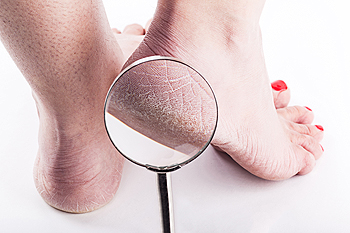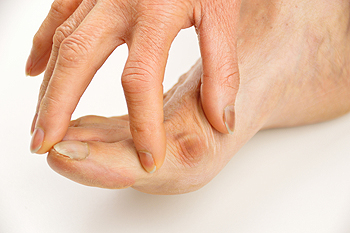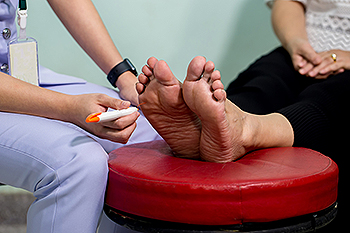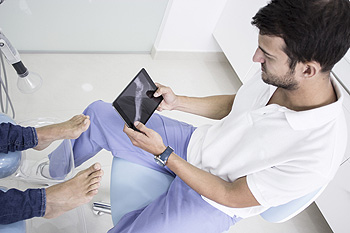Items filtered by date: April 2022
When Cracked Heels Need Professional Care

While cracked heels may be considered by most to be an unsightly and mildly uncomfortable nuisance, they can develop into a more troublesome and serious condition in certain cases. Cracked heels can often improve with home treatment—such as by sloughing off dead skin in the shower with a pumice stone or by applying foot cream at night and covering the feet with cotton socks. However, the elderly, and people with certain medical issues should not attempt to treat cracked heels at home. Cracked heels that are allowed to deepen may bleed, and become painful or even infected. Severely cracked heels can be particularly problematic in older adults, or people with diabetes, eczema, psoriasis, or thyroid issues, and should be attended to by a podiatrist to help treat them properly and safely, and to avoid the possible development of cellulitis or a foot ulcer.
Cracked heels are unsightly and can cause further damage to your shoes and feet. If you have any concerns, contact one of our podiatrists from The Sun Healthcare & Surgery Group. Our doctors can provide the care you need to keep you pain-free and on your feet.
Cracked Heels
Cracked heels appear unappealing and can make it harder for you walk around in sandals. Aside from looking unpleasant, cracked heels can also tear stockings, socks, and wear out your shoes. There are several methods to help restore a cracked heel and prevent further damage.
How Do You Get Them?
Dry skin is the number one culprit in creating cracked heels. Many athletes, walkers, joggers, and even swimmers suffer from cracked heels. Age and skin oil production play a role to getting cracked heels as well.
Promote Healing
Over the counter medicines can help, especially for those that need instant relief or who suffer from chronic dry feet.
Wear Socks – Wearing socks with medicated creams helps lock in moisture.
Moisturizers – Applying both day and night will help alleviate dryness which causes cracking.
Pumice Stones – These exfoliate and remove dead skin, which allows for smoother moisturizer application and better absorption into the skin.
Change in Diet
Eating healthy with a well-balanced diet will give the skin a fresh and radiant look. Your body responds to the kinds of food you ingest. Omega-3 fatty acids and zinc supplements can also revitalize skin tissue.
Most importantly, seek professional help if unsure how to proceed in treating cracked heels. A podiatrist will help you with any questions or information needed.
If you have any questions, please feel free to contact our offices located in Antioch, Martinez, and Concord, CA . We offer the newest diagnostic and treatment technologies for all your foot care needs.
The Dangers of Gangrene
Several chronic diseases that affect the feet – such as diabetes, peripheral artery disease (PAD), and Raynaud’s disease – can lead to a severe deterioration of the tissues that causes gangrene. When blood circulation to an area of the body, such as the feet or legs, is blocked, the tissue breaks down and eventually dies. Symptoms include coldness and numbness; pain, redness, and swelling; a foul odor emanating from the affected area; and discoloration of the skin. If left untreated, gangrene may lead to amputation and can sometimes be fatal. Treatments include antibiotics, removal of dead tissue, hyperbaric oxygen therapy, and removal of the blocked artery, depending on age, physical condition, and severity of the case. If you have any of the conditions listed above, and especially if you are experiencing these symptoms, it is strongly suggested that you consult a podiatrist as quickly as possible for an examination, diagnosis, and treatment plan.
When dealing with systemic disease of the feet, it is extremely important to check the affected areas routinely so that any additional problems are caught quickly. If you have any concerns about your feet and ankles contact one of our podiatrists from The Sun Healthcare & Surgery Group. Our doctors will assist you with all of your podiatric needs.
Systemic Diseases of the Feet
Systemic diseases affect the whole body, and symptoms usually are displayed in the feet. This condition can make a patient’s ability to walk unbearable. Systemic diseases include gout, diabetes mellitus, neurological disorders, and arthritis.
Gout – is caused by an excess of uric acid in the body. Common symptoms include pain, inflammation, and redness at the metatarsal/phalangeal joint of the base big toe. Gout can be treated by NSAIDs to relieve pain and inflammation, and other drugs that lower the acid levels in the body.
Diabetes mellitus – is an increase in the level of blood sugar that the body cannot counteract with its own insulin. Failure to produce enough insulin is a factor in Diabetes.
Diabetes of the Feet
Diabetic Neuropathy – may lead to damaged nerves and affect the feet through numbness and loss of sensation.
Peripheral Vascular Disease – can restrict the blood flow to the feet, and often times lead to amputation of the feet.
If you have any questions please feel free to contact our offices located in Antioch, Martinez, and Concord, CA . We offer the newest diagnostic and treatment technologies for all your foot and ankle needs.
What Is a Foot and Ankle Surgeon?
Like a brain surgeon is a specialist in the field of medicine, a foot and ankle surgeon is a specialist in the field of podiatry. They have more education and training in the field of foot and ankle care than other healthcare providers. After graduation from college, they continue their education for four more years at an accredited podiatric medical school, graduating with a degree as Doctor of Podiatric Medicine (DPM). After that, similar to medical doctors, DPMs enter a 3-year residency in podiatric medicine and surgery to train in general medicine, general surgery and surgical specialties. They also must complete a large number of diverse foot and ankle surgeries before they can be certified by the American Board of Foot and Ankle Surgery. A Doctor of Podiatric Medicine is well-versed in detecting diseases (like diabetes, arthritis, and cardiovascular disease) that commonly affect the foot and ankle health of their patients, as well as dealing with foot and ankle ailments, injuries and conditions more common to the general public.
If you are experiencing pain in the feet or ankles, don’t join the stubborn majority refusing treatment. Feel free to contact one of our podiatrists from The Sun Healthcare & Surgery Group. Our doctors can provide the care you need to keep you pain-free and on your feet.
What Is a Podiatrist?
Someone would seek the care of a podiatrist if they have suffered a foot injury or have common foot ailments such as heal spurs, bunions, arch problems, deformities, ingrown toenails, corns, foot and ankle problems, etc.
Podiatric Treatment
A podiatrist will treat the problematic areas of the feet, ankle or lower leg by prescribing the following:
- Physical therapy
- Drugs
- Orthotic inserts or soles
- Surgery on lower extremity fractures
A common podiatric procedure a podiatrist will use is a scanner or force plate which will allow the podiatrist to know the designs of orthotics. Patients are then told to follow a series of tasks to complete the treatment. The computer will scan the foot a see which areas show weight distribution and pressure points. The podiatrist will read the analysis and then determine which treatment plans are available.
If you have any questions please feel free to contact our offices located in Antioch, Martinez, and Concord, CA . We offer the newest diagnostic and treatment technologies for all your foot and ankle needs.
What Causes a Bunion to Form?
 While the exact cause of a bunion is not always apparent, their bony disfigurement is hard to miss. Genetics are believed to sometimes play a role in the development of a bunion. Many consider gout and rheumatoid arthritis as a possible link to certain bunions that have formed, as well as abnormal foot structures such as flat feet, flexible joints, loose ligaments, and more. Tight, pointy high heels and other types of ill-fitting footwear may worsen a structural abnormality and increase the likelihood of a bunion forming. Standing for prolonged periods of time can also worsen bunion symptoms. Podiatrists deal with bunions every day and have various techniques for correcting them, depending upon how far along the deformity has progressed. Don’t delay in making an appointment with a podiatrist to have your feet examined if you have redness, swelling, soreness, an existing bony bump, or a bump that’s beginning to form at the joint of your big toe.
While the exact cause of a bunion is not always apparent, their bony disfigurement is hard to miss. Genetics are believed to sometimes play a role in the development of a bunion. Many consider gout and rheumatoid arthritis as a possible link to certain bunions that have formed, as well as abnormal foot structures such as flat feet, flexible joints, loose ligaments, and more. Tight, pointy high heels and other types of ill-fitting footwear may worsen a structural abnormality and increase the likelihood of a bunion forming. Standing for prolonged periods of time can also worsen bunion symptoms. Podiatrists deal with bunions every day and have various techniques for correcting them, depending upon how far along the deformity has progressed. Don’t delay in making an appointment with a podiatrist to have your feet examined if you have redness, swelling, soreness, an existing bony bump, or a bump that’s beginning to form at the joint of your big toe.
If you are suffering from bunion pain, contact one of our podiatrists of The Sun Healthcare & Surgery Group. Our doctors can provide the care you need to keep you pain-free and on your feet.
What Is a Bunion?
Bunions are painful bony bumps that usually develop on the inside of the foot at the joint of the big toe. As the deformity increases over time, it may become painful to walk and wear shoes. Women are more likely to exacerbate existing bunions since they often wear tight, narrow shoes that shift their toes together. Bunion pain can be relieved by wearing wider shoes with enough room for the toes.
Causes
- Genetics – some people inherit feet that are more prone to bunion development
- Inflammatory Conditions - rheumatoid arthritis and polio may cause bunion development
Symptoms
- Redness and inflammation
- Pain and tenderness
- Callus or corns on the bump
- Restricted motion in the big toe
In order to diagnose your bunion, your podiatrist may ask about your medical history, symptoms, and general health. Your doctor might also order an x-ray to take a closer look at your feet. Nonsurgical treatment options include orthotics, padding, icing, changes in footwear, and medication. If nonsurgical treatments don’t alleviate your bunion pain, surgery may be necessary.
If you have any questions, please feel free to contact our offices located in Antioch, Martinez, and Concord, CA . We offer the newest diagnostic and treatment technologies for all your foot care needs.



